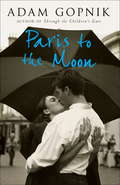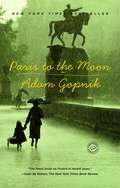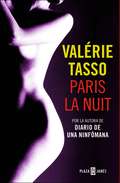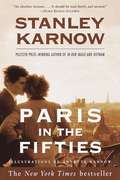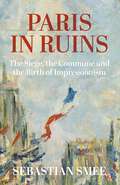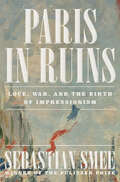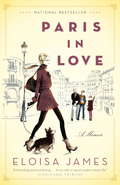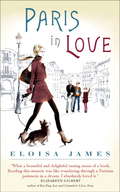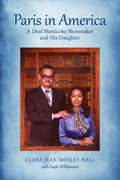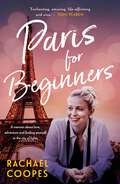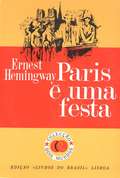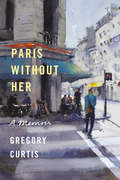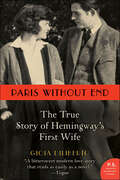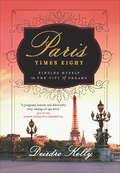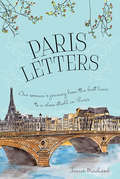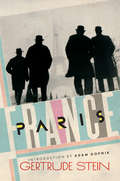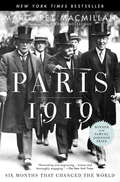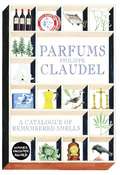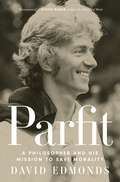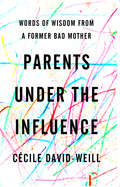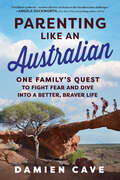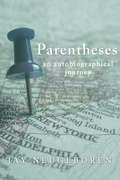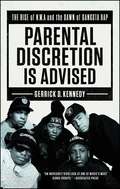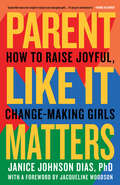- Table View
- List View
Paris to the Moon: A Family in France
by Adam GopnikIn 1995, Adam Gopnik and his wife, and their infant son left the familiar comforts and hassles of New York for the urbane glamour of Paris. Charmed by the beauties of the city, Gopnik set out to experience for himself the spirit and romance that has so captivated American writers throughout the Twentieth century. In the grand tradition of Stein and Hemingway, Gopnik planned to walk the paths of the Tuilleries, to enjoy philosophical discussion in cafes in short, to lead the fabled life of an American in Paris. Of course, as readers of Gopnik's beloved 'Paris Journals' in the New Yorker know, there was also the matter of raising a child and carrying on with everyday, not so fabled life. Evenings with French intellectuals precede middle-of-the night baby feedings; afternoons are filled with trips to the Musee d'Orsay and pinball games; weekday leftovers are eaten while three star chefs debate a 'culinary crisis'. With singular wit and insight, Gopnik manages to weave the magical with the mundane in a wholly delightful book.
Paris to the Moon: A Family In France (A\vintage Original Ser.)
by Adam GopnikParis. The name alone conjures images of chestnut-lined boulevards, sidewalk cafés, breathtaking façades around every corner--in short, an exquisite romanticism that has captured the American imagination for as long as there have been Americans. In 1995, Adam Gopnik, his wife, and their infant son left the familiar comforts and hassles of New York City for the urbane glamour of the City of Light. Gopnik is a longtime New Yorker writer, and the magazine has sent its writers to Paris for decades--but his was above all a personal pilgrimage to the place that had for so long been the undisputed capital of everything cultural and beautiful. It was also the opportunity to raise a child who would know what it was to romp in the Luxembourg Gardens, to enjoy a croque monsieur in a Left Bank café--a child (and perhaps a father, too) who would have a grasp of that Parisian sense of style we Americans find so elusive. So, in the grand tradition of the American abroad, Gopnik walked the paths of the Tuileries, enjoyed philosophical discussions at his local bistro, wrote as violet twilight fell on the arrondissements. Of course, as readers of Gopnik's beloved and award-winning "Paris Journals" in The New Yorker know, there was also the matter of raising a child and carrying on with day-to-day, not-so-fabled life. Evenings with French intellectuals preceded middle-of-the-night baby feedings; afternoons were filled with trips to the Musée d'Orsay and pinball games; weekday leftovers were eaten while three-star chefs debated a "culinary crisis."As Gopnik describes in this funny and tender book, the dual processes of navigating a foreign city and becoming a parent are not completely dissimilar journeys--both hold new routines, new languages, a new set of rules by which everyday life is lived. With singular wit and insight, Gopnik weaves the magical with the mundane in a wholly delightful, often hilarious look at what it was to be an American family man in Paris at the end of the twentieth century. "We went to Paris for a sentimental reeducation-I did anyway-even though the sentiments we were instructed in were not the ones we were expecting to learn, which I believe is why they call it an education."
Paris la nuit
by Valérie TassoEn Paris la nuit la autora se plantea una redefinición total de los sexos. Un libro atrevido que sorprende y hechiza, un relato autobiográfico que se lee como una novela y donde nada es lo que parece. Pero que desvela la intimidad de una mujer valiente, sus miedos y sus deseos. Para mejorar sus conocimientos de lengua japonesa, Valérie Tasso decide inscribirse en el Instituto de Lenguas Orientales de París. Se aloja en casa de su amiga Mimi, una lesbiana que esconde más de un secreto, y a los pocos días conoce a Pipo, un enigmático taxista que le descubre los rincones ocultos del París más prohibido, el que no aparece en las guías turísticas. Convertida en una cronista -o en una voyeur-, Valérie cuenta todo lo que vio y sintió durante aquel caluroso verano parisino en el que vivió intensamente noches de pasión y deseo: orgías sadomasoquistas, escenas con prostitutasy travestis, un reencuentro sexual en un cóctel de la alta sociedad... Todo ello le obligará a replantearse su identidad sexual y le provocará una perplejidad que irá creciendo a lo largo del libro: ¿qué misterio esconde Pipo? Si en Diario de una ninfómana relataba sin tapujos sus experiencias sexuales, en Paris la nuit la autora se plantea una redefinición total de los sexos: sugiere que no hay homosexuales o heterosexuales sino personas, y todas ellas son, en última instancia, bisexuales. Reseña:«Episodios no aptos para mentes puritanas.»Cosmopolitan
Paris in the Fifties
by Stanley KarnowIn July 1947, fresh out of college and long before he would win the Pulitzer Prize and become known as one of America's finest historians, Stanley Karnow boarded a freighter bound for France, planning to stay for the summer. He stayed for ten years, first as a student and later as a correspondent for Time magazine. By the time he left, Karnow knew Paris so intimately that his French colleagues dubbed him "le plus parisien des Américains" --the most Parisian American. Now, Karnow returns to the France of his youth, perceptively and wittily illuminating a time and place like none other. Karnow came to France at a time when the French were striving to return to the life they had enjoyed before the devastation of World War II. Yet even during food shortages, political upheavals, and the struggle to come to terms with a world in which France was no longer the mighty power it had been, Paris remained a city of style, passion, and romance. Paris in the Fifties transports us to Latin Quarter cafés and basement jazz clubs, to unheated apartments and glorious ballrooms. We meet such prominent political figures as Charles de Gaulle and Pierre Mendès-France, as well as Communist hacks and the demagogic tax rebel Pierre Poujade. We get to know illustrious intellectuals, among them Jean-Paul Sartre, Simone de Beauvoir, Albert Camus, and André Malraux, and visit the glittering salons where aristocrats with exquisite manners mingled with trendy novelists, poets, critics, artists, composers, playwrights, and actors. We meet Christian Dior, who taught Karnow the secrets of haute couture, and Prince Curnonsky, France's leading gourmet, who taught the young reporter to appreciate the complexities of haute cuisine. Karnow takes us to marathon murder trials in musty courtrooms, accompanies a group of tipsy wine connoisseurs on a tour of the Beaujolais vineyards, and recalls the famous automobile race at Le Mans when a catastrophic accident killed more than eighty spectators. Back in Paris, Karnow hung out with visiting celebrities like Ernest Hemingway, Orson Welles, and Audrey Hepburn, and in Paris in the Fifties we meet them too.A veteran reporter and historian, Karnow has written a vivid and delightful history of a charmed decade in the greatest city in the world.From the Trade Paperback edition.
Paris in Ruins: The Siege, the Commune and the Birth of Impressionism
by Sebastian SmeePulitzer-winner Sebastian Smee relives the remarkable birth of Impressionism from the ashes of war Paris, January 1871 – the final, agonising days of the Franco-Prussian War. As the German army cements its advantage, shells rattle through the Left Bank. It is a bitterly cold winter; there is no fuel, no medicine, no food. The city&’s poorer citizens have long turned to eating rats, cats and dogs. France has been brought to its knees. Édouard Manet, Berthe Morisot, and Edgar Degas are trapped in the besieged city. Renoir and Bazille have joined regiments outside of Paris, while Monet and Pissarro fled the country just in time. Out of the Siege and the Commune, these artists developed a newfound sense of the fragility of life. A feeling for transience – reflected in Impressionism&’s emphasis on fugitive light, shifting seasons, glimpsed street scenes, and the impermanence of all things – would change art history forever. This is the extraordinary account of the &‘Terrible Year&’ in Paris and its monumental impact on the rise of Impressionism.
Paris in Ruins: Love, War, and the Birth of Impressionism
by Sebastian SmeeA Boston Globe “20 Books We Can’t Wait to Read This Fall” A Next Big Idea Club “Must-Read Book for September 2024” The Pulitzer Prize–winning art critic’s gripping account of the “Terrible Year” in Paris and its monumental impact on the rise of Impressionism. From the summer of 1870 to the spring of 1871, famously dubbed the “Terrible Year” by Victor Hugo, Paris and its people were besieged, starved, and forced into surrender by Germans—then imperiled again as radical republicans established a breakaway Commune, ultimately crushed by the French Army after bloody street battles and the burning of central Paris. As renowned art critic Sebastian Smee shows, it was against the backdrop of these tumultuous times that the Impressionist movement was born—in response to violence, civil war, and political intrigue. In stirring and exceptionally vivid prose, Smee tells the story of those dramatic days through the eyes of great figures of Impressionism. Édouard Manet, Berthe Morisot, and Edgar Degas were trapped in Paris during the siege and deeply enmeshed in its politics. Others, including Pierre-August Renoir and Frédéric Bazille, joined regiments outside of the capital, while Claude Monet and Camille Pissarro fled the country just in time. In the aftermath, these artists developed a newfound sense of the fragility of life. That feeling for transience—reflected in Impressionism’s emphasis on fugitive light, shifting seasons, glimpsed street scenes, and the impermanence of all things—became the movement’s great contribution to the history of art. At the heart of it all is a love story; that of Manet, by all accounts the father of Impressionism, and Morisot, the only woman to play a central role in the movement from the start. Smee poignantly depicts their complex relationship, their tangled effect on each other, and their great legacy, while bringing overdue attention to the woman at the heart of Impressionism. Incisive and absorbing, Paris in Ruins captures the shifting passions and politics of the art world, revealing how the pressures of the siege and the chaos of the Commune had a profound impact on modern art, and how artistic genius can emerge from darkness and catastrophe.
Paris in Love: A Memoir
by Eloisa James<P>In 2009, New York Times bestselling author Eloisa James took a leap that many people dream about: she sold her house, took a sabbatical from her job as a Shakespeare professor, and moved her family to Paris. <P>Paris in Love: A Memoir chronicles her joyful year in one of the most beautiful cities in the world. With no classes to teach, no committee meetings to attend, no lawn to mow or cars to park, Eloisa revels in the ordinary pleasures of life--discovering corner museums that tourists overlook, chronicling Frenchwomen's sartorial triumphs, walking from one end of Paris to another. <P>She copes with her Italian husband's notions of quality time; her two hilarious children, ages eleven and fifteen, as they navigate schools--not to mention puberty--in a foreign language; and her mother-in-law Marina's raised eyebrow in the kitchen (even as Marina overfeeds Milo, the family dog). <P>Paris in Love invites the reader into the life of a most enchanting family, framed by la ville de l'amour. <P><b>A New York Times Bestseller</b>
Paris in Love: A Memoir
by Eloisa JamesA New York Times Bestseller. After years of living vicariously through the heroines in her novels, bestselling author Eloisa James takes a leap that most of us can only daydream about. She sells her house, leaves her job as a Shakespeare professor, and packs her husband and two protesting children off to Paris. Grand plans are abandoned as she falls under the spell of daily life as a Parisienne exquisite food, long walks by the Seine, reading in bed, displays of effortless chic around every corner, and being reminded of what really matters in a place where people seem to kiss all the time. Against one of the world s most picturesque backdrops, she copes with her Italian husband s notions of quality time; her two hilarious children, ages eleven and fifteen, as they navigate schools not to mention puberty in a foreign language; and her formidable mother-in-law, Marina, who believes dogs should be fed prosciutto and wives should live in the kitchen. An irresistible love letter to a city that will make you want to head there, Paris in Love is also a joyful testament to the pleasures of savouring life.
Paris in America: A Deaf Nanticoke Shoemaker and His Daughter
by Clara Jean Hall Gayle WilliamsonClara Jean Mosley Hall has inhabited various cultural worlds in her life: Native American, African American, Deaf, and hearing. The hearing daughter of a Deaf Nanticoke Indian, who grew up in Dover, Delaware’s black community in the 1950s and 60s, Hall describes the intersections of these identities in Paris in America. By sharing her father’s experiences and relating her own struggles and successes, Hall honors her father’s legacy of hard work and perseverance and reveals the complexities of her own unique background. Hall was abandoned by her Deaf African-American mother at a young age and forged a close bond with her father, James Paris Mosley, who communicated with her in American Sign Language. Although his family was American Indian, they—like many other Nanticoke Indians of that region—had assimilated over time into Dover’s black community. Hall vividly recounts the social and cultural elements that shaped her, from Jim Crow to the forced integration of public schools, to JFK and Motown. As a CODA (Child of Deaf Adults) in a time when no accessibility or interpreting services were available, she was her father’s sole means of communication with the hearing world, a heavy responsibility for a child. After her turbulent teenage years, and with the encouragement of her future husband, she attended college and discovered that her skills as a fluent ASL user were a valuable asset in the field of education. Hall went on to become a college professor, mentor, philanthropist, and advocate for Deaf students from diverse backgrounds. Her memoir is a celebration of her family, her faith, her journey, and her heritage.
Paris for Beginners: A memoir about love, adventure and finding yourself in the city of lights
by Rachael CoopesEnchanting, amusing, life-affirming and wise.' Toni PearenSometimes the best compass to follow is your heart.Actress Rachael Coopes had a serious boyfriend and successful career in Australia when she was awarded a scholarship to study at a renowned clown school in Paris.It was the opportunity of a lifetime, so she upped sticks and fully surrendered herself to the possibilities of Paris. Cue a coveted pied-à-terre with a view of the Eiffel Tower, quaffing champagne at midnight with her glamorous new amies, and learning how to flirt in French. But for all its charm and sensual pleasures, Paris had a hard lesson or two to teach her about life, and love.Paris for Beginners is about growing up (even when you're already, supposedly, a fully-fledged adult) and figuring out what you need in life, set against the perennially alluring backdrop of the City of Lights.
Paris for Beginners: A memoir about love, adventure and finding yourself in the city of lights
by Rachael CoopesEnchanting, amusing, life-affirming and wise.' Toni PearenSometimes the best compass to follow is your heart.Actress Rachael Coopes had a serious boyfriend and successful career in Australia when she was awarded a scholarship to study at a renowned clown school in Paris.It was the opportunity of a lifetime, so she upped sticks and fully surrendered herself to the possibilities of Paris. Cue a coveted pied-à-terre with a view of the Eiffel Tower, quaffing champagne at midnight with her glamorous new amies, and learning how to flirt in French. But for all its charm and sensual pleasures, Paris had a hard lesson or two to teach her about life, and love.Paris for Beginners is about growing up (even when you're already, supposedly, a fully-fledged adult) and figuring out what you need in life, set against the perennially alluring backdrop of the City of Lights.
Paris Without Her: A Memoir
by Gregory CurtisIn this moving, tender memoir of losing a beloved spouse, the longtime editor of Texas Monthly, newly widowed, returns alone to a city whose enchantment he's only ever shared with his wife, in search of solace, memories, and the courage to find a way forward.At the age of sixty-six, after thirty-five years of marriage, Gregory Curtis finds himself a widower. Tracy--with whom he fell in love the first time he saw her--has succumbed to a long battle with cancer. Paralyzed by grief, agonized by social interaction, Curtis turns to watching magic lessons on DVD--"a pathetic, almost comical substitute" for his evenings with Tracy.To break the spell, he returns to the place he had the "best and happiest times" of his life. As he navigates the storied city and contemplates his new future, Curtis relives his days in Paris with Tracy, piecing together the portrait of a woman, a marriage, parenthood, and his life's great love through the memories of six unforgettable trips to the City of Lights.Alone in Paris, Curtis becomes a tireless wanderer, exploring the city's grand boulevards and forgotten corners as he confronts the bewildering emotional state that ensues after losing a life partner. Paris Without Her is a work of tremendous courage and insight--an ode to the lovely woman who was his wife, to a magnificent city, and to the self we might invent, and reinvent, there.
Paris Without End: The True Story of Hemingway's First Wife
by Gioia Diliberto“A bittersweet modern love story [that] reads as easily as a novel.” —Vogue“Fascinating. . . . A detailed, grittier portrait of the woman Hemingway loved and left.” —NewsdayHadley Richardson and Ernest Hemingway were the golden couple of Paris in the twenties, the center of an expatriate community boasting the likes of Scott and Zelda Fitzgerald, Gertrude Stein and Alice B. Toklas, and James and Nora Joyce. In this haunting account of the young Hemingways, Gioia Diliberto explores their passionate courtship, their family life in Paris with baby Bumby, and their thrilling, adventurous relationship—a literary love story scarred by Hadley’s loss of the only copy of Hemingway’s first novel and ultimately destroyed by a devastating ménage à trois on the French Riviera.Compelling, illuminating, poignant, and deeply insightful, Paris Without End provides a rare, intimate glimpse of the writer who so fully captured the American imagination and the remarkable woman who inspired his passion and his art—the only woman Hemingway never stopped loving.
Paris Times Eight: Finding Myself in the City of Dreams
by Deirdre Kelly&“Very engaging . . . This charming travel memoir shows us how a person and a city can grow and change in tandem.&” —Booklist Over eight visits to Paris, Deirdre Kelly has found herself—first as a nineteen-year-old and then later as a budding writer, a dance critic, and a fashion reporter. Subsequent visits—with her mother, her future husband, and later as a mother herself—have shown her that while some parts of Paris remain constant, her life is always evolving. More than just a beautiful and romantic backdrop for her self-discovery, Paris itself contributes to that discovery, emerging as a principal character in Kelly&’s life, an influence that inspires, guides, and teaches as she ages. A terrific gift for budding travelers, Francophiles, and women on their own path toward growth, this book reminds readers of their own favorite place. &“A poignant, honest, and deliciously sexy coming-of-age story.&” —Jan Wong, national bestselling author of Beijing Confidential &“Deirdre Kelly&’s writing is fast-paced and full of color and gives the reader an insider&’s view. She gets it right.&” —Sally Armstrong, national bestselling author of The Nine Lives of Charlotte Taylor &“Takes the reader on a colorful travelogue along the narrow streets of the Marais district, the spectacular Tuileries gardens and the bustling Galleries Lafayette department store . . . a fast-paced, breezy read, its substance subtly woven into a tale of a city whose glamour and beauty never fades.&” —Ottawa Citizen &“At times pensive, sardonic and laugh-out-loud funny, as it chronicles a real life with all its comedies and tragedies.&” —Calgary Herald
Paris Letters
by Janice MacleodFinding love and freedom in a pen, a paintbrush...and Paris How much money does it take to quit your job? Exhausted and on the verge of burnout, Janice poses this questions to herself as she doodles on a notepad at her desk. Surprisingly, the answer isn't as daunting as she expected. With a little math and a lot of determination, Janice cuts back, saves up, and buys herself two years of freedom in Europe. A few days into her stop in Paris, Janice meets Christophe, the cute butcher down the street--who doesn't speak English. Through a combination of sign language and franglais, they embark on a whirlwind Paris romance. She soon realizes that she can never return to the world of twelve-hour workdays and greasy corporate lingo. But her dwindling savings force her to find a way to fund her dreams again. So Janice turns to her three loves--words, art, and Christophe--to figure out a way to make her happily-ever-after in Paris last forever.
Paris France
by Gertrude Stein Adam GopnikMatched only by Hemingway's A Moveable Feast, Paris France is a "fresh and sagacious" (The New Yorker) classic of prewar France and its unforgettable literary eminences. Celebrated for her innovative literary bravura, Gertrude Stein (1874-1946) settled into a bustling Paris at the turn of the twentieth century, never again to return to her native America. While in Paris, she not only surrounded herself with--and tirelessly championed the careers of--a remarkable group of young expatriate artists but also solidified herself as "one of the most controversial figures of American letters" (New York Times). In Paris France (1940)--published here with a new introduction from Adam Gopnik--Stein unites her childhood memories of Paris with her observations about everything from art and war to love and cooking. The result is an unforgettable glimpse into a bygone era, one on the brink of revolutionary change.
Paris 1919: Six Months That Changed the World (Coleção Nova Fronteira Ser.)
by Margaret MacmillanWinner of the Samuel Johnson Prize Winner of the PEN Hessell Tiltman Prize Winner of the Duff Cooper Prize Between January and July 1919, after "the war to end all wars," men and women from around the world converged on Paris to shape the peace. Center stage, for the first time in history, was an American president, Woodrow Wilson, who with his Fourteen Points seemed to promise to so many people the fulfillment of their dreams. Stern, intransigent, impatient when it came to security concerns and wildly idealistic in his dream of a League of Nations that would resolve all future conflict peacefully, Wilson is only one of the larger-than-life characters who fill the pages of this extraordinary book. David Lloyd George, the gregarious and wily British prime minister, brought Winston Churchill and John Maynard Keynes. Lawrence of Arabia joined the Arab delegation. Ho Chi Minh, a kitchen assistant at the Ritz, submitted a petition for an independent Vietnam. For six months, Paris was effectively the center of the world as the peacemakers carved up bankrupt empires and created new countries. This book brings to life the personalities, ideals, and prejudices of the men who shaped the settlement. They pushed Russia to the sidelines, alienated China, and dismissed the Arabs. They struggled with the problems of Kosovo, of the Kurds, and of a homeland for the Jews. The peacemakers, so it has been said, failed dismally; above all they failed to prevent another war. Margaret MacMillan argues that they have unfairly been made the scapegoats for the mistakes of those who came later. She refutes received ideas about the path from Versailles to World War II and debunks the widely accepted notion that reparations imposed on the Germans were in large part responsible for the Second World War. A landmark work of narrative history,Paris 1919is the first full-scale treatment of the Peace Conference in more than twenty-five years. It offers a scintillating view of those dramatic and fateful days when much of the modern world was sketched out, when countries were created--Iraq, Yugoslavia, Israel--whose troubles haunt us still. From the Hardcover edition.
Parfums: A Catalogue of Remembered Smells
by Philippe ClaudelFrom the sizzling sharpness of freshly cut garlic to the cool tang of a father's aftershave; the heady intoxication of a fumbled first kiss to the anodyne void of disinfectant and death, this is a decadently original olfactory memoir. In sixty-three elusive episodes we roam freely across the countryside of Lorraine, North-East France, from kitchen to farm to a lover's bed. Recognising the bittersweet nostalgia of a scent that slips away on the summer breeze, Claudel demonstrates again his impeccable grasp of the personal and the universal, interweaved with a rare self-deprecating charm. This is an evocative patchwork at once earthy and ethereal, erotic and heart-breaking. Claudel permits us a glimpse of moments that have driven him to delight or despair, creating through the fading aromas of the past fragments of humour, insight and quite intangible beauty.
Parfit: A Philosopher and His Mission to Save Morality
by David EdmondsFrom the bestselling coauthor of Wittgenstein&’s Poker, an entertaining and illuminating biography of a brilliant philosopher who tried to rescue morality from nihilismDerek Parfit (1942–2017) is the most famous philosopher most people have never heard of. Widely regarded as one of the greatest moral thinkers of the past hundred years, Parfit was anything but a public intellectual. Yet his ideas have shaped the way philosophers think about things that affect us all: equality, altruism, what we owe to future generations, and even what it means to be a person. In Parfit, David Edmonds presents the first biography of an intriguing, obsessive, and eccentric genius.Believing that we should be less concerned with ourselves and more with the common good, Parfit dedicated himself to the pursuit of philosophical progress to an extraordinary degree. He always wore gray trousers and a white shirt so as not to lose precious time picking out clothes, he varied his diet as little as possible, and he had only one serious non-philosophical interest: taking photos of Oxford, Venice, and St. Petersburg. In the latter half of his life, he single-mindedly devoted himself to a desperate attempt to rescue secular morality—morality without God—by arguing that it has an objective, rational basis. For Parfit, the stakes could scarcely have been higher. If he couldn&’t demonstrate that there are objective facts about right and wrong, he believed, his life was futile and all our lives were meaningless.Connecting Parfit&’s work and life and offering a clear introduction to his profound and challenging ideas, Parfit is a powerful portrait of an extraordinary thinker who continues to have a remarkable influence on the world of ideas.
Parents Under the Influence: Words of Wisdom from a Former Bad Mother
by Cécile David-WeillPart American and part French, part memoir and part guide, this book offers a fresh, unique, and powerful perspective on the challenges of parenting and how to find a rewarding path forward for parents and children alike.How should we raise our children? It should be a simple enough question to answer but in fact it is an intimidating and complex one. We often address it by deciding to do either exactly what our parents did or just the opposite. After that we rely on a cocktail of love and instinct, hoping it will be enough to overcome the difficulties ahead. Far from having perfect free will, however, we are all under the influence. The child still within us confuses, influences, or undermines all our aspirations as parents and prevents us from sticking to the philosophy we initially hoped to follow. These unresolved emotions drive us to reproduce the upbringing we received, including the behaviors that have hurt us the most. In Parents Under the Influence, Cécile David-Weill draws on her own parenting blunders and successes as well as concrete examples, case studies, and works of fiction to guide readers, helping them heal from the past and become effective, nurturing parents.
Parenting Like an Australian: One Family's Quest to Fight Fear and Dive into a Better, Braver Life
by Damien Cave"A beautiful tale of one family trying to figure things out—and, at the same time, a brilliant synthesis of a century of psychological science on how all of us can learn to dive headfirst into challenges, grow and adapt, and ultimately do well in life." —Angela Duckworth, New York Times bestselling author of GritRaise kids to be strong, confident, and happy—by parenting the Australian wayDamien Cave and his wife Diana thought they understood what it meant to take risks. As two journalists who traveled the world covering pressing international stories, they were convinced they had seen it all; that is, until they moved to Australia. Suddenly, their kids were being thrown into giant Pacific waves in intensive lifeguard bootcamps, and they were expected to be present and participating instead of obsessing about work or politics. They soon noticed what seemed to be a societal surrender of control to nature and community. In other words? Their American customs were completely disrupted. Living their new beachside life didn't end up being a relaxing retreat, but instead caused a complete reevaluation of the ways they acted as people and parents—and it all had to do with taking unexpected risks and learning how to manage them.New York Times Australia Bureau Chief Damien Cave delivers an impactful and informative account of how risk taking in parenting, and in all aspects of life, creates happier, healthier individuals and communities. Cave's exploration of Australian parenting culture, through gripping research and storytelling, will have you questioning everything you thought you knew about safety, risk, parenting, and, ultimately, being human."An illuminating parenting guide, a takedown of America's self-esteem industrial complex, and a deep study of contrasts between the Australian and American minds." —Pamela Druckerman, New York Times bestselling author of Bringing Up Bébe
Parental Discretion Is Advised: The Rise of N.W.A and the Dawn of Gangsta Rap
by Gerrick D. KennedyExperience the stunning rise, fall, and legacy of N.W.A. and how they put their stamp on pop culture, black culture, and hip-hop music forever in this &“incredibly vivid look at one of music&’s most iconic groups&” (Associated Press).In 1986, a group was formed that would establish the foundation of gangsta rap and push the genre forward, electrifying fans with their visceral and profane lyrics that glorified the dark ways of street life and brazenly challenged the police system. Eazy-E, Dr. Dre, Ice Cube, MC Ren, and DJ Yella caused a seismic shift in hip-hop when they decided to form N.W.A in 1986. With their hard-core image, bombastic sound, and lyrics that were equal parts poetic, lascivious, conscious, and downright in-your-face, N.W.A spoke the truth about life on the streets of Compton, California—then a hotbed of poverty, drugs, gangs, and unemployment. Going beyond the story portrayed in the 2015 blockbuster movie Straight Outta Compton, through firsthand interviews, extensive research, and top-notch storytelling, Los Angeles Times music reporter Gerrick Kennedy transports you back in time and offers a front-row seat to N.W.A&’s early days and the drama and controversy that followed the incendiary group as they rose to become multiplatinum artists. Kennedy leaves nothing off the table in his pursuit of the full story behind the group&’s most pivotal moments, such as Ice Cube&’s decision to go solo after their debut studio album became a smash hit; their battle with the FBI over inflammatory lyrics; incidents of physical assault; Dr. Dre&’s departure from the group to form Death Row Records with Suge Knight; their impact on the 1992 L.A. riots; Eazy-E&’s battle with AIDS; and much more. A bold, riveting, &“non-stop, can&’t-put-it-down ride&” (Library Journal), Parental Discretion Is Advised unveils the true and astonishing history of one of the most transcendent and controversial musical groups of the 1980s and 1990s.
Parent Like It Matters: How to Raise Joyful, Change-Making Girls
by Janice Johnson DiasAn accessible blueprint to embolden our daughters to be critical thinkers, fearless doers, and joyful change agents for our future—from the proud mother of teen activist Marley Dias, founder of 1000BLACKGIRLBOOKS.&“A stunning and pathbreaking how-to guide and memoir for every mom, dad, or caregiver who believes in rearing children to be healthy individuals and caring citizens.&”—Khalil Gibran Muhammad, author of The Condemnation of Blackness Renowned sociologist Dr. Janice Johnson Dias has devoted her life to nurturing and training girls to become change-makers—whether through her investment in her daughter Marley&’s humanitarian projects or through her work with the GrassROOTS Community Foundation&’s &“SuperCamp.&” In these unprecedented times, her work has never been more urgent, as parents find themselves asking: How do we teach our children to change the world? Dr. Johnson Dias knows that self-realized girls are created through intentional parenting. And so she asks parents to make deliberate choices—from babyhood through adolescence—that will give their girls the resources and foundation to take hold of their own futures and to create sustainable social change. Unlike other parenting experts, Dr. Johnson Dias doesn&’t urge parents to focus solely on their children. Instead, she tasks them with a personal challenge: to find their own joy. Just as Dr. Johnson Dias brings her own jubilant passion to parenting, mentoring, and teaching, she inspires caregivers to do the same. Using cutting-edge research and Dr. Johnson Dias&’s own experiences, Parent Like It Matters offers information and strategies for making discussions of racism and sexism a daily practice, identifying heroes and mentors, educating yourselves together, and uncovering your girl&’s passions and what issues drive her the most. Parenting is enormous work; it can be as overwhelming as it is fulfilling. Within the pages of Parent Like It Matters, parents will find the invaluable tools they need to raise resilient, optimistic girls who determine for themselves what their world will look like.
